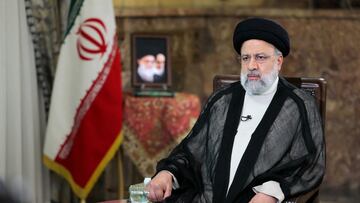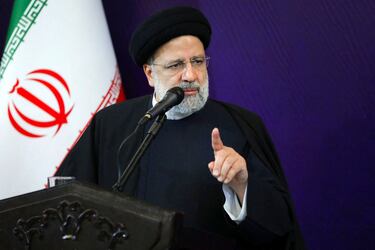Who is Ebrahim Raisi, the president of Iran? Time in office, political and religious views, age, family...
Iran’s president, Ebrahim Raisi, has been involved in a helicopter crash. Here, we will explain what we know so far and a little bit about the leader.

State media in Iran is reporting that the country’s President, Ebrahim Raisi, has been involved in a helicopter accident that included a “hard landing” on Sunday. The country’s foreign minister, Hossein Amirabdollahian, was traveling with the president when the incident occurred near the border with Azerbaijan, near the city of Jolfa.
No details have been provided about the leader’s condition or that of those traveling with him, but rescue teams have been deployed to the area.
Meet Ebrahim Raisi, the President of Iran
The government of Iran adopted the form of an “Islamic republic,” in accordance with the 1979 Constitution, thus in its power structure, there is a president who is the second-highest-ranking official after the Supreme Leader. Ebrahim Raisi, whose full name is Sayyid Ebrahim Raisol-Sadati, holds the presidency. He was born on 14 December 1960 in Mashad, Iran.
- Father: Seyyed Haji, a cleric
- Mother: Sayyedeh Esmat Khodadad Husseini
- Family: His wife is Jamileh Alamolhoda since 1983. They have two daughters.
- Education: Attended to the seminary in Qom; Shahid Motahari University. He has a Doctorate in Law
- Religion: Islamic, Shia Muslim
On June 19, 2021, Ebrahim Raisi, a hardline cleric and head of the national judiciary, won the presidential elections in Iran with 62% of the votes, although only 48.8 percent of eligible voters participated, marking the lowest turnout in a presidential election since the 1979 revolution.
Raisi is considered a hardliner both domestically and internationally. He believes in the strict adherence to Islamic law.

The functions of the president of Iran
The president is the second-highest-ranking official in Iran. According to Article 113 of the Constitution, after the Supreme Leader, “the President shall be the highest state official responsible for the implementation of the Constitution and, as the Head of the Executive, for exercising executive powers, except for those matters directly related to the Leader.”
Related stories
In accordance with the Constitution, the President must be chosen from “distinguished religious and political personalities” who possess the following qualifications: being of Iranian origin, holding Iranian citizenship, being efficient and prudent, having a track record of good reputation, honesty, and piety, and being loyal and faithful to the essential principles of the Islamic Republic of Iran and the country’s official faith.
The President is elected by direct popular vote for a four-year term, but consecutive re-election is permitted for one term. He is responsible for setting the country’s economic policies. According to Article 126, he is directly responsible for the State Plan and Budget, as well as Administrative and Civil Service Affairs of the Country.
Complete your personal details to comment